
Featured Blog | This community-written post highlights the best of what the game industry has to offer. Read more like it on the Game Developer Blogs or learn how to Submit Your Own Blog Post
Getting excellent voice acting into your indie game - part 2
How to convince talented voice actors to audition for your game? In Part 2, I show you exactly how to run a casting call either through email or my new favorite - Discord!

In part 1, I tried to help you answer the question, “should I have voice acting in my game?” And for indies that haven’t done it before, that question can be hard to answer.

If you’re still uncertain, I recommend reading my Part 1 article. I explain how to make a quick estimate of the time and money for adding voice acting to your game. There’s even a spreadsheet calculator included that will give you hard numbers to work with.
Are you ready for part two?
In this article, I’ll explain what a casting call is and how to announce one in a way that brings you a solid response. I’ll also talk about a new venue for finding and working with actors that I think is amazing – Discord.
That’s right… it turns out that Discord might be an indie’s single best place to go for voice acting. I am excited to explain that, but first…
Casting Calls… How Do They Even Work?
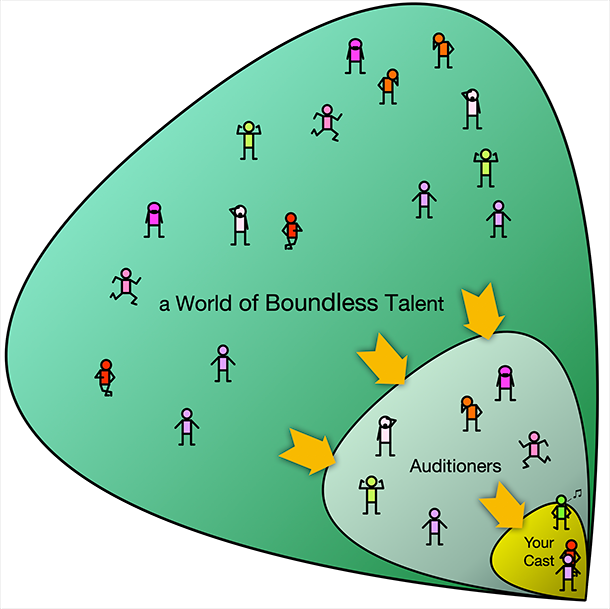
A casting call is a request for actors to audition.
You announce your casting call on social media.
Voice actors look over your casting information. Some of them decide to audition.
You listen to the auditions and pick the actors that you believe are best suited to voice characters in your game.
You pay the cast actors and they give you precious WAV files.
This article will cover preparing for and announcing your casting call. And future articles in this series will cover all the subsequent activities leading up to actors’ performances going into your game as voiceovers.
By the way, it really is a world of boundless talent out there. Remember, you are hunting for magic!
Casting Call Steps
There are lots of little tasks leading up to the casting call. Let’s give that work some structure…
Finish your script (the document containing all of your character dialogue).
Be ready to pay actors ridiculously fast.
Decide on how actors will give you auditions – email or Discord.
Write your Casting Document, which describes your game, characters, and how actors will audition. (Don’t worry – I’m giving you a template doc for this!)
Post your casting call announcement on social media. This is just an advertisement that follows some conventions.
I’ll go over each step in detail.
Step One: Finish Your Script

You’ll want all of your dialogue written so that you can plan your casting call correctly. If you don’t, then you’re introducing risk of casting poorly and maybe pissing off some folks. It might seem like you can start with a rough idea of your characters and then flesh out the exact dialogue later. But I advise against that for the following reasons:
Your estimate of how much money you’ll need to pay actors depends on the dialogue.
Your script dialogue will be the basis of your part descriptions that entice certain actors to audition. Changing the advertised aspects of a part can make you look disorganized or manipulative.
After actors are cast, you want minimal delay in getting them dialogue to record. If they have to wait a week for you to write their dialogue, you lose momentum and focus.
So yeah… finish the script before doing anything else related to casting.
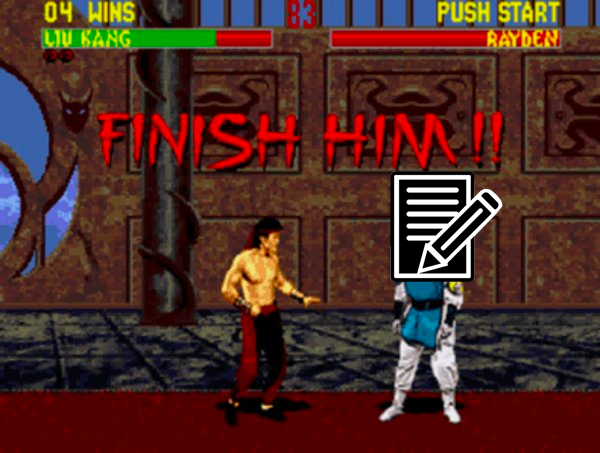
Screenwriting Software
If individual parts have more than a hundred words of dialogue, I recommend getting them into a screenplay format. It looks like this:
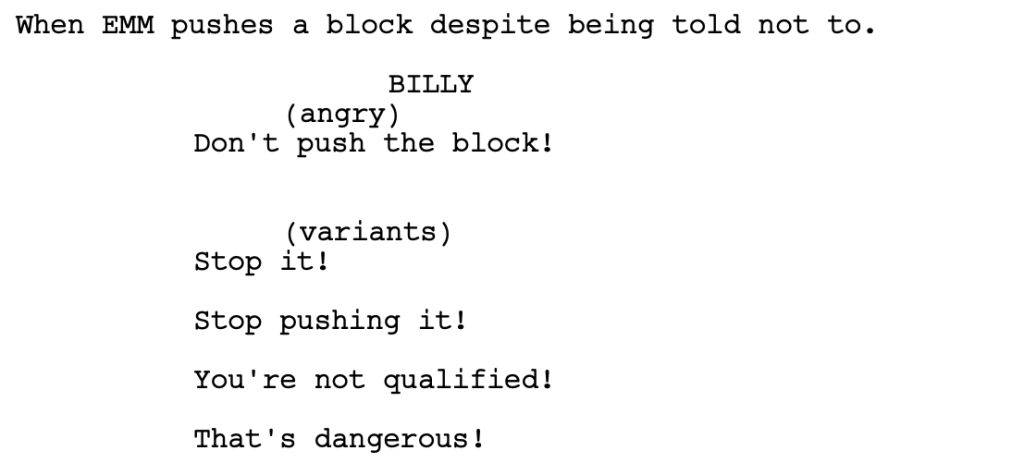
To do this, you can use screenwriting software like Final Draft, WriterDuet, or Celtx. This will let you format scripts in a conventional way that actors are very comfortable reading. When you later send lines for recording to your cast actors, you will ideally send those lines in screenplay format.
Most screenwriting software will also create reports to answer questions like, “which scenes (levels) does this character appear in?” or “how many words are in this character’s dialogue?” It’s a little work to learn the screenplay format. The main advantage is that you’ll get better performances from actors. If you are interested, I explain the reasons for using a screenplay format and some tips on writing interactive dialogue in my screenplay format for interactive dialogue article.
Step Two: Be Ready to Pay Actors

This may sound trivial to you. “Of course, I’m going to pay people!” you say.
No, you don’t understand.
I just got done successfully casting and recording with forty actors. Not one of them flaked. They all had their recordings to me in less than ten days. The closest thing I did to nagging was asking a few people, “when is a comfortable time for you to send me your recordings?”
That is like rolling “six” on dice forty times in a row! To some extent, I just got lucky that the cast actors happened to be such a good group of people.
But I did some things that helped. I pushed to get everything to actors quickly, including payment. I paid upfront, typically within two days after announcing casting decisions.
You don’t want anything slowing the process of working with actors. So that means being ready to pay.With your script finished, you’ll have a word count and number of parts to cast. You can use those to estimate the money you’ll need to pay actors. (See part 1 for an estimation formula you can use.)
How will you pay actors? In 2021, I think most any actor will take PayPal, and it is currently the most universal way. You can offer multiple payment options, (e.g. CashApp, Venmo) if that works for you. I like sticking with one to keep things simple.
If you do use PayPal, I would recommend linking more than one payment method to your account. Here is a list of actual problems I handled during The Godkiller casting in paying forty people:
A linked savings account hit the federally-mandated monthly transaction count limit and stopped working for payments.
A linked Visa card stopped working for unknown reasons, and a week later began working again. Both PayPal and the bank said it was the other party that was responsible.
A linked American Express card could not be used in one specific foreign country. Was it Malaysia? I forget.
If you have 2 or 3 payment methods available inside of PayPal, when one fails in a random way, you just switch to another one. Linked bank accounts seem to be cheapest and most reliable option, but it takes 2-5 days to link them, so make sure you give yourself lead time.
I personally would pay upfront for any service request to an audition-cast actor less than $300. Paying upfront says, “I care less about the money and more about the good work you will do for me next.” You don’t get mired in conversations around trust and payment terms.

I’m purposefully omitting any accounting advice, but consider your obligations to various governmental entities when you pay people. It’s the same stuff you have to figure out for paying anybody that contributes to your game.
So in summary, know how much you will need to pay, be ready to pay it quickly, and have backup payment methods.
Step Three: Choose Audition Method – Email or Discord


The standard way for actors to send you their auditions is via email. With this approach, you’ll post casting call announcements in different places, e.g. Twitter, Discord. There would be a link in your posts to a casting doc or web-based equivalent. That doc would give actors instructions to email auditions to you. Email is the “no nonsense” approach. If you want to run your casting call tight and efficient, go with that. It also gives you an ability to work with a larger pool of actors beyond those that are comfortable with Discord. If you only have a handful of parts to cast, I’d probably use email for receiving audition communication. It’s harder to enjoy the social benefits of handling auditions via Discord with a smaller number of parts and actors.
But you could be extra-nifty and use a Discord server as a place for actors to post their auditions. Auditions would be posted publicly as audio files on the server, available for anyone’s listening. This creates an event on your server which can be entertaining and educational. Not all actors like public auditions, but most do. And other people on your server (e.g. development team, beta testers) may be interested in watching the auditions as well.
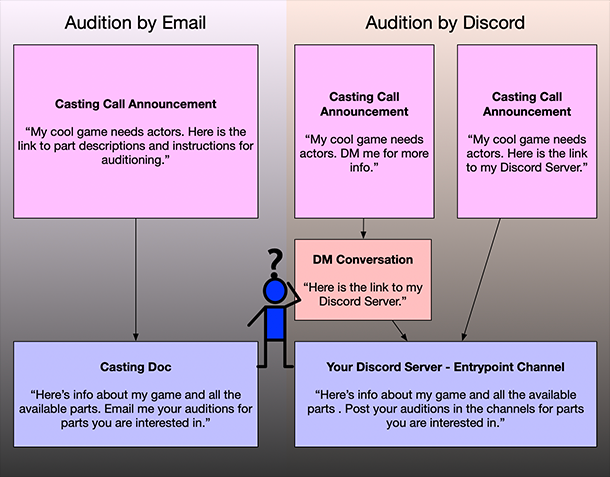
Discord has voice features built into it, so it gives you some advantages in setting things up like live direction sessions, table reads, or rehearsals. You can also get those same features in any videoconferencing solution, e.g. Zoom, Google Hangouts. One thing missing from Discord is an ability to record calls. I had a Discord call this morning with two actors to do a table read (an informal rehearsal where actors have the script in front of them). I just ran audio recording software separate from Discord to capture the meeting, and sent them both MP3s after the call.
The transparency of public conversation on Discord helps build trust. For example, I posted this message to check that all cast members had successfully received payment.

Group messaging has more value in establishing trust than contacting people individually via email or DMs. Implicit in this group post is the assurance that any payment problems can be made visible quickly. Cast members can talk with each other and compare experiences. I’m not an unscrupulous director/producer, and I doubt you will be. But it’s hard to prove that to strangers.
An Actual Discord Server with Auditions You Can Look At
I’m inviting you onto my Discord server so you can see for yourself a real-world example of running auditions through Discord. Just click that link off to the left, and it will take you to the right place in your browser – no app install needed.
On the #casting-discussion channel, you can scroll up to 6/23/21 to see the end of the casting call and people’s feedback on how it went. After getting lots of nice compliments, I cajoled people to give some constructive criticism.
That’s where I learned that some actors were initially doubtful about holding the auditions on Discord as opposed to email. Essentially, they were worried about it being unprofessional or inefficient. There’s probably a group of actors I’ll never hear from that quietly left after deciding they didn’t like public auditions through Discord. But overall the feedback was very positive, with some actors even asking me to convince other voice directors to run auditions the “Discord” way. That’s one of the reasons I’m writing this article touting the advantages of Discord auditions.
To give you an idea of the auditions themselves, see the channels listed under the “GK1 Closed Auditions” category. There were many amazing performances. It’s not hard to imagine a similar level of talent auditioning for your game.
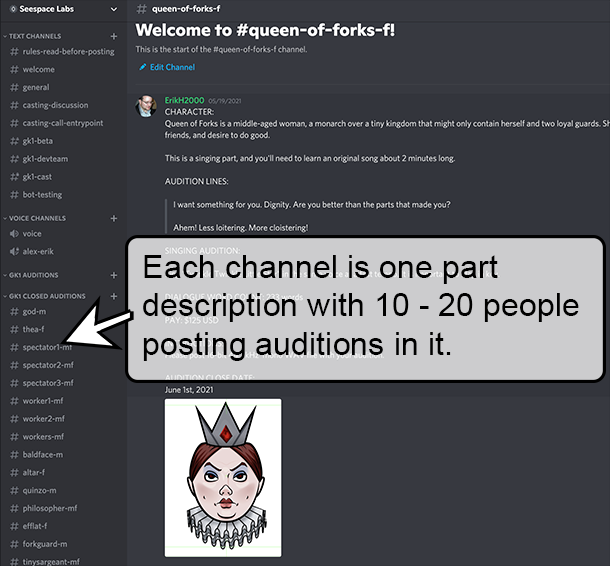
Making Your Choice
Discord or Email? To simplify your decision, here is what I recommend: Use the standard audition-by-email approach if any of the following are true:
You’re mainly interested in running auditions efficiently.
You want a very large response to your casting call. (>20 auditions for each part)
You have a part with specific criteria to meet that will need a wide posting to bring in enough auditions. (e.g. you must cast a part to an actor with matching racial/ethnic background)
You are casting less than 5 parts.
Otherwise, I say run your auditions on Discord. And have fun with it.
Step 4: Write Your Casting Document

If you’ve done everything described so far, you’re ready to write your casting document. What will it have in it?
Summary of your project
General audition instructions
Part descriptions
Instead of me describing in excessive detail what goes in the doc, just have a look at this example casting doc that I adapted from my real casting call for The Godkiller in June. You can click that Google Docs link, make a copy, and edit the copied doc to match your game.
If you’re using email-based auditions, then your casting doc will be what your casting call announcements link to. Actors will look through the doc to find the parts in which they are interested, and then email you their auditions.
If you’re using Discord-based auditions, then your casting doc is just a private place to compose text before you copy it over to your Discord server in channel posts. Discord isn’t a great place for crafting work-in-progress text, so you’re better off composing it elsewhere.
Setting the Audition Deadline
Your audition deadline should include a date, time, and timezone. E.g. January 2nd, 11PM GMT. Don’t use midnight as the time – it leads to confusion as to whether people have an extra 24 hours or not from the beginning of the day.
You might be tempted to cast some great actor with a strong audition and close auditions before your posted deadline. No, don’t do that!
Accept auditions until the deadline and honestly consider them all – from earliest to latest. Many voice actors have time management strategies designed to maximize their chances of finding work. They might be hustling hard to respond to other casting calls, deliver work for clients, or other things. You’ve wasted their time if they read and think about your info, make plans to audition for you, and come back later to find you’ve closed down auditions early.
If you don’t get a large enough response or the auditions you’ve received aren’t showing the performance you need, it is acceptable to extend the deadline. I’ll talk about how to do this smoothly in the next article which covers running the auditions. For now, just keep in mind that it is acceptable to extend audition deadlines, but it is not acceptable to pull deadlines forward.
How long should the auditions last?
One week.
I like keeping momentum and focus by limiting delays. One week seems to be about the shortest duration that doesn’t lose auditioners due to availability issues. I think that’s probably because there are voice actors that have preferred recording days of the week. So if your duration spans a week, you’ll hit most everybody’s preferred times to record.
Casting Rounds – When It Won’t All Fit in One Week
Suppose you have many, many parts to cast. That was my situation with 50 parts to cast through auditions on The Godkiller – Chapter 1. If I ran auditions for all those parts in one week, it would have been bad. Like Fyre Festival “bad”.
So I just split casting into 4 separate rounds, each one with 10 or so parts up for grabs. (Click the image below if you want to see the planning spreadsheet.) Each of the four rounds had a separate casting call that I announced on social media.
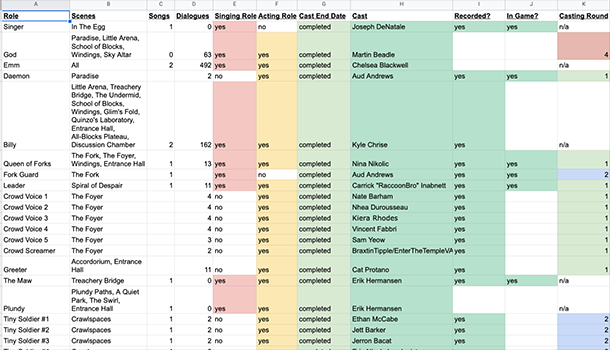
How many parts can you handle in a casting round?
Divide the number of available hours you have in a week by 8.
So if you have 40 hours/week to devote to casting activities, then on your very first casting round as a newbie director, I’d recommend not casting more than 5 parts in that round. Eight hours per part may seem like a lot of time, but trust me on this number for now. I’ll explain the work you’ll be doing in the next “Part 3” article of the series.
After you’ve ran your first round of casting, you might try increasing the number of parts in subsequent rounds. Even if your intent was to scale up quickly to a massive casting call with hundreds of parts, I’d start small on the first casting round, and scale up later.
Writing Part Descriptions
You want to specify “dealbreaker” criteria at the top of the part description that lets an actor skip over the part quickly if it’s not a match for them. The biggest one is gender. In my game, many actors need to sing which can be a dealbreaker, so I have that at the top too. In a game where you are concerned about portraying characters with natural, realistic acting you might also include the age of the character. When you specify gender and age, this is describing requirements of the performance and not the real-life traits of the actor.
After the “dealbreakers”, give a description of all the things about the character that affect the performance. What is the general personality of the character? Don’t be afraid to use tropes like “mad scientist”, “tough drill sergeant”, or “manic pixie dreamgirl”. Cliches are shortcuts for communication. And if you are hoping for the character to be acted with a certain accent or quirk, just ask for it. Don’t make actors guess about what you want.
Don’t include backstory or “flavor” text that’s more than a sentence or two long. If it’s too long, it becomes unwanted homework for the actor. Sometimes I add in-game video or concept art. If I link to anything for fun, I always say it’s not required and won’t give an advantage for the audition.
For the audition lines, find some lines in your script that have a bigger payoff in discovering the actors’ suitability for the part. Dramatic peaks like rage or sorrow are often difficult for actors to portray well. Saying lines fast with good articulation might be another distinguishing challenge. If the character needs to scream or yell, I would at least ask for one short yell in an audition as a test of the actor’s recording environment. (“Short” because prolonged screaming is hard on the throat and unreasonable to ask for inside of an audition effort.)
Find the more difficult or important performance areas for a part in your script and use those for audition lines. The audition lines don’t have to exactly match the script – you can tweak them to target the needs of the audition. Limit audition lines to under one hundred words per part.
Again, you can look at my example casting doc to get an idea of a specific format to use.
Setting Up Your Discord Server for Auditions
I’ll explain one way of setting up a Discord Server that worked well for me.
If you haven’t set up a Discord server for your game or studio yet – it’s free and very easy. (The total opposite of setting up a Steam Store page!) You can have a server up in fifteen minutes, and the various refinements you might choose to make can be done incrementally. If your Discord server is brand new, running a casting call through it also has an advantage of increasing the user count and posting activity so your server doesn’t look like a ghost town to later invitees.
Create a read-only #casting-call-entrypoint channel. This will contain a top-of-channel post that describes your project and gives audition instructions. The content can be similar to what is inside of the example casting doc . You want “read-only” permissions to disallow posts so that your first post is always at the top of the channel when invitees arrive to it.
Right-click the channel name to create an invite that will take people specifically to this #casting-call-entrypoint channel.
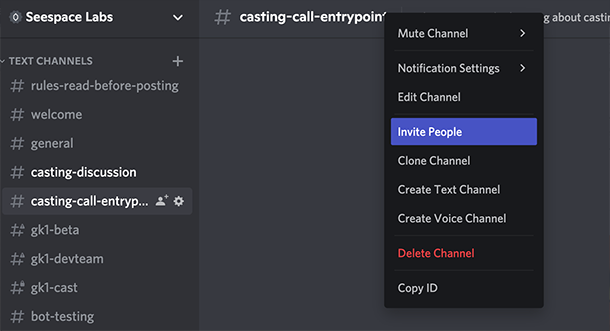
On the invite link, I’d set the expiration time and max number of users to infinite. This is to avoid the hassle of issuing new links repeatedly
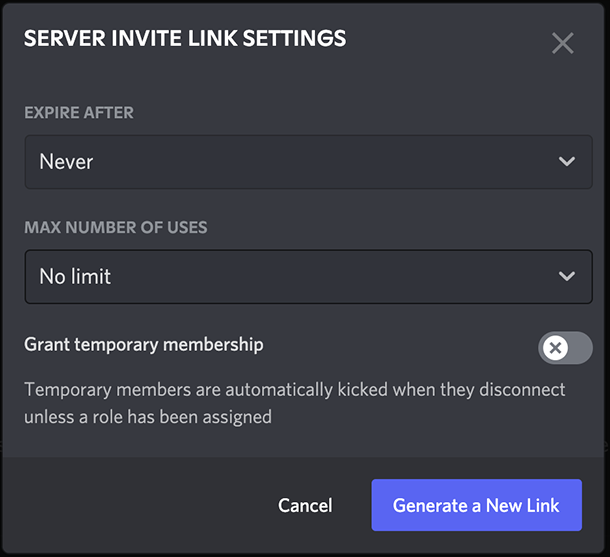
Copy that generated link to your Casting Document for later use.
Create a separate #casting-call-discussion channel where people can talk.
Create channels for your parts, one channel per part. I recommend using the convention #partname-gg, where the “gg” will be “m” (male), “f” (female), or “mf” (male or female). Actors will post their auditions in these channels.
If you like keeping the history of your auditions around for posterity, or you have multiple rounds of casting planned, it’s good to have a “closed auditions” category to move the part channels into after you finish casting.
Again, here is the invite link to my Discord server where you can see how I set it up for my casting calls.
Step Five: Posting Your Casting Call

Last step!
You can probably write one casting call and post it multiple places without having to tailor it to each location. But of course, read and follow the instructions wherever you post.
Here’s what I posted at VAC and other places for my Discord-based casting call. This post is on the #casting-calls-paid channel of the Voice Acting Club Discord server. You can visit that server to see many other examples of casting calls.
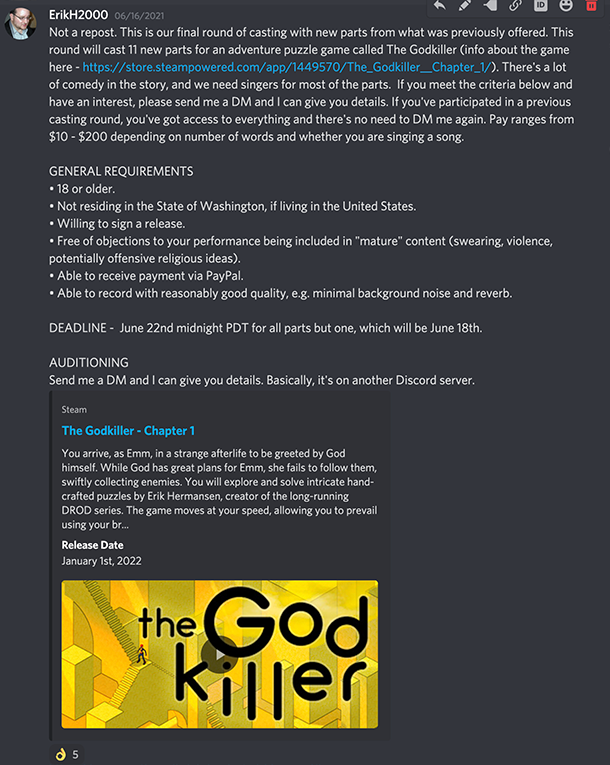
The post above contradicts two pieces of advice I gave in this series – paying session minimums consistent with mid-tier pricing in the VAC Indie Rate Guide, and not using midnight for a deadline. On my next casting call, I’ll follow my own advice.
I didn’t post an invite link to my Discord server and instead asked interested actors to DM me. I used this “DM contact” because:
Sometimes server admins/mods don’t like it if you post a link to your Discord server on their Discord server. It can look like you’re trying to move their user activity over to your server.
Getting DMs from actors gives me a small opportunity to set a friendly tone, learn about the actor (they might send demo reels), and help them with any questions.
This decision to use “DM contact” meant I needed to have about 200 DM conversations in June like this one:
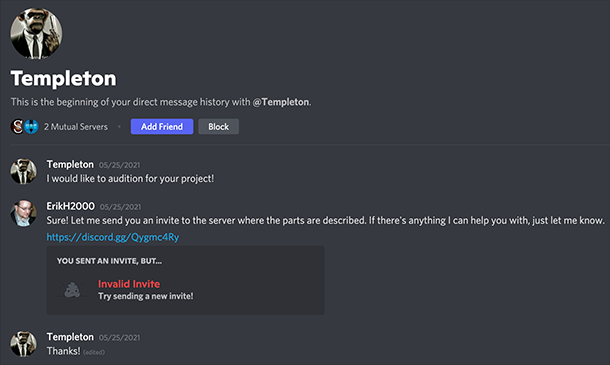
…but that’s just copy-and-pasting some boilerplate and occasionally customizing the text to what the person said.
If you have a Steam store page set up, you should include a link in the announcement. You might get a few wishlists, but that’s not the reason to do it. A Steam store link gives your casting call credibility. Besides that, it’s an efficient way to reuse content you’ve already created to teach people what your game is about. The bright yellow “Godkiller” artwork shown in the casting call above automatically came from my Steam store page as an embedded link preview.
If you don’t have a Steam store page or you don’t like the embedded preview that it generates, find some other artwork from your game that looks spiffy. I recommend using the most polished artwork or imagery you have, which could be a screenshot from your game. The emphasis should be on showing you have a real game that will be finished. Actors really want the productions to which they contribute to be released – it adds value to their resumés.
Your casting call announcement is not trying to grab people’s attention or charm them. Actors looking for work will read your announcement with a reasonable attention span. Write in proper, grammatical English. Fix the words with red squiggles (spell check) on them. Be concise and clear. Always remember the more professional actors you’d like to respond.
Where to Post Your Casting Call
Okay, do you want a lot of auditions or do you want a lot of auditions?
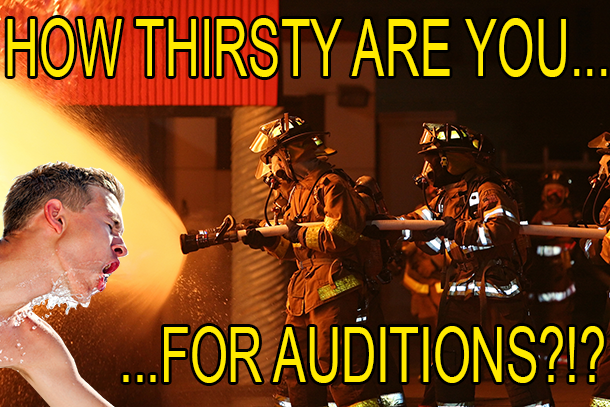
In Part 1, I said it was great to have options to choose from. That was the point of running a casting call instead of commissioning voice work. But it is very possible to be overwhelmed with too many auditions.
Consider that you will be duty-bound to leave your auditions open to submissions until your announced deadline. And you will need to fairly consider every audition sent to you.
It’s hard to predict what the response will be to a casting call. But given the following:
You will be paying mid-tier rates.
You will be advertising a casting call for a video game. (That’s a bonus for many actors.)
You’ll have your audition deadline one week out from the casting call announcement.
You’ll have some nice artwork or screenshot from your game to put in the casting call announcement.
You will be following conventions and looking professional in all communication.
…I think you can post to a few places and get 10-20 auditions for each part. I don’t think you’ll have a problem with too few auditions, because you can see, after a few days, if you need to boost your signal by posting the casting call announcement in more places. And if you are still coming up short on auditions as your audition deadline nears, you have the option to extend the deadline.
For me, 10-20 auditions per part is about the right amount of auditions to receive. If I was arranging a casting call to receive more auditions than that, I’d want filtering help where an assistant would bring me a short list of the top contenders. It gets overwhelming to listen to a lot of people saying the same audition lines. Also, if you chose to use Discord for auditions with public posting, too many visible auditions can scare off voice actors that come later.
Post here initially:
Voice Acting Club Discord Server
Voice Town Discord Server
If you find you need a boost beyond that:
Tweet your casting call announcement with #voice and #voiceover.
VA Casting Call RT on Twitter (follow their directions to Tweet your casting call announcement, and they will probably retweet you)
And if you need to pull out the big guns:
Using Backstage, you’ll find the culture and conventions are different. It’s a very “Hollywood business” kind of website. There will be a strict form-based way of entering information for your casting call that may take you an hour or two. The actors that respond will be more professional on average. You’ll have more self-promotion, negotiation, and rejection from them. You’ll see TV and film credits on resumés, and plenty of SAG-AFTRA folks willing to risk taking a non-union job on your little game project. Put on a thick skin, be unfailingly professional, and you can find hundreds of talented actors willing to audition for your game on Backstage.
I would not ask auditioners or cast actors to help you get the word out. Some will see it as working against their own chances to be cast.
There are many other places to post casting calls. These are just the ones I’ve either used personally or have been recommended by people I trust. You should not have to buy ads anywhere to get a good response. Assuming you’ve followed the other advice I’ve given, e.g. mid-tier pay and professionalism, posting in the above places should be more than sufficient for your needs.
Coming Next… Part Three
After you post the casting call, the actors will come to audition. They really will! You’ll have better luck finding actors to voice your game than you will finding someone to take a free, slightly-used, twin mattress off your hands.

Continue to Part 3 of the series. I explain how to run the auditions and make good casting decisions. And I’ll tell you some mistakes I made that you can avoid making yourself.
Read more about:
Featured BlogsAbout the Author(s)
You May Also Like







.jpeg?width=700&auto=webp&quality=80&disable=upscale)








